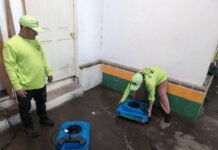When choosing a fence for your property, durability and weather resistance are key factors to consider. Vinyl fencing has become a popular choice for homeowners due to its low maintenance and aesthetic appeal. But is it suitable for your climate? In this article, we’ll explore how vinyl fencing holds up in different weather conditions and help you decide if it’s the right option for your home.
What Is Vinyl Fencing?
Vinyl fencing is made from polyvinyl chloride (PVC), a synthetic plastic material known for its strength and resistance to environmental factors. Unlike wood, which can rot, warp, or attract pests, vinyl fencing is designed to withstand harsh weather conditions without deteriorating.
How Does Vinyl Fencing Perform in Different Climates?
- Hot and Sunny Climates
If you live in an area with intense sun and high temperatures, vinyl fencing can be an excellent choice. Here’s why:
- UV Resistance: High-quality vinyl fencing is treated with UV inhibitors to prevent fading and brittleness caused by prolonged sun exposure.
- Heat Tolerance: Unlike wood, which can crack in extreme heat, vinyl expands and contracts without warping.
- No Moisture Absorption: Vinyl won’t dry out or splinter like wood in arid climates.
Tip: Choose lighter-colored vinyl to minimize heat absorption and reduce the risk of warping over time.
- Cold and Snowy Climates
For regions with freezing temperatures and heavy snowfall, vinyl fencing offers several advantages:
- Freeze-Thaw Resistance: Unlike wood, vinyl doesn’t absorb moisture, preventing cracks from freezing and thawing cycles.
- Snow and Ice Resilience: Vinyl is non-porous, so ice buildup won’t damage the material.
- Low Maintenance: No need to worry about rust (like metal fences) or rot (like wood fences).
Consideration: In extremely cold climates, vinyl may become slightly more brittle, but high-quality vinyl is designed to withstand these conditions.
- Wet and Humid Climates
If your area experiences heavy rain, humidity, or even coastal salt spray, vinyl fencing is a smart choice because:
- Waterproof: Unlike wood, vinyl won’t rot, warp, or develop mold and mildew.
- Salt-Resistant: Ideal for coastal areas where saltwater can corrode metal fences.
- No Rust or Corrosion: Unlike iron or steel, vinyl won’t rust in damp conditions.
Tip: Ensure proper drainage around the fence posts to prevent water pooling, which could weaken the installation over time.
- Windy and Storm-Prone Areas
For locations with strong winds or frequent storms, vinyl fencing can be a reliable option if installed correctly:
- Flexible Yet Sturdy: Vinyl has some flexibility, allowing it to bend slightly in high winds without breaking.
- Reinforced Options: Some vinyl fencing comes with metal reinforcements for added stability.
- Lightweight: Unlike heavy wood or metal fences, vinyl is less likely to be uprooted in severe weather.
Consideration: Proper installation with deep-set posts and concrete footings is crucial for wind resistance.
Long-Term Durability of Vinyl Fencing
One of the biggest selling points of vinyl fencing is its longevity. Here’s how it compares to other materials:
- No Rot or Rust: Unlike wood and metal, vinyl won’t degrade due to moisture or oxidation.
- Minimal Maintenance: No need for painting, staining, or sealing—just occasional cleaning with soap and water.
- Color Retention: High-quality vinyl resists fading, keeping its appearance for decades.
Potential Drawbacks of Vinyl Fencing
While vinyl fencing is highly durable, there are a few considerations:
- Initial Cost: Vinyl can be more expensive upfront than wood, but it saves money long-term on maintenance.
- Limited Repair Options: If a section is damaged, it may need full replacement rather than a simple repair.
- Extreme Temperature Sensitivity: In rare cases, very high or low temperatures can affect flexibility.
Conclusion: Is Vinyl Fencing Right for You?
Vinyl fencing is a versatile and durable option for most climates, from scorching heat to freezing winters. Its resistance to moisture, UV rays, and pests makes it a long-lasting, low-maintenance alternative to traditional fencing materials.




